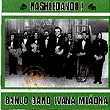|
| ||||||||||||||

Banjo Band Ivana Mládka Back in the 70's, in the darkest days of 'normalization' that followed the invasion of Czechoslovakia, Ivan Mládek provided a much needed breath of fresh air. He managed to sell millions of records during the most depressing times and many of his hits imbedded into the subconsciousness of the nation are now passed on to the new generation, very much like folksongs. So what was it that made his deceptively simple ditties instant classics? An adequate banjo player, an OK song writer and a pretty average singer, Mládek captivated millions with his incredible sense of humor. Hits such as Medvedi nevedí (ze turisti nemaj zbrane) (Bears Don't Know Hikers Don't Carry Guns), or Zeleznicní vlecka povalila krecka (A Railroad Car Knocked Over My Hamster) showed off his talent as an engaging story teller. Dása Nováková ranks among the highest achievements in Czech Dadaistic tradition. Loosely translated, Mládek slowly unveils the following saga: "Kathy told Mary With repeated listening you may also make out in the background a sad chorus of male voices: "C sharp, B, G sharp Shortly after the Communist government officially banned any English expressions in Czech songs, Mládek and his band released Jez (Dam), which is of course pronounced "yes" and which featured the very common Czech suffix -nou, pronounced "no." And his song Pochod Praha-Prcice did wonders to popularize the yearly march (pochod) between these two cities. Originally Nashledanou! (Goodbye!) came out in 1977 as their
second album, but on this CD re-release Bonton added 8 singles from
1976 and 1983. The mood is set by the record-handling instructions from
the original LP:
The single Jozin z bazin (Joe from the Swamps) leads off. Characteristically, it is a combination of Central Europe oom-pah music and dixieland - with a kazoo. Story is about a swamp monster that specializes in devouring citizens of Prague and which can be destroyed only by a crop-dusting plane. Similarly, Dívka s dolícky (Girl With Dimples) features a kazoo instead of the trumpet, a violin instead of a clarinet, and a story about a girl injured by a cloth-pin. Hlasná Trebán (a settlement just outside of Prague) is an a cappella marching song with the commander barking instructions throughout the song. My personal favorite is the underrated last cut Az pujdes spát (When You Go To Bed), which sounds a lot like Squirrel Nut Zippers.The lyrics were written by Zdenek Sverák, the Oscar-winning star of 'Kolya:'
Unlike most of the other cuts, this one really swings. The drumming and the bass guitar (instead of the usual tuba) are less plodding, the banjo, the guitar and especially the melodeon (credited as a violin) drive the song forward, and even the musical arrangement is a little more inventive than usual. It is difficult to convey all of Mládek's contribution as a lyricist, satirist and an engaging storyteller. His greatest achievement however was in providing a much needed escape and an witty diversion during one of the most difficult periods of his nation. For that he deserves the greatest credit. Copyright © 1999 Ivan Sever
| ||||||||||||||
| © 2011 Luna Kafé |